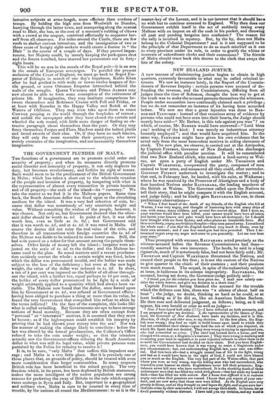THE GOVERNMENT PLUNDER OF MALTA.
THE functions of a government are to promote social order and security of property ; and when its measures directly promote social disorder and insecurity of property, it not only neglects its duty, but becomes revolutionary, and forfeits its right of tenure. Such would seem to be the predicament of the British Government in Malta ; which has taken a short cut to the wholesale vexation of the people and invasion of property, by tampering with what is the representative of almost every transaction in private business and of all property—the cash of the island—its " currency." We take the matter as we find it in the Maltese papers. Some time back, the South American dollar was fixed upon as the circulating medium for the island. It was a very bad selection of coin, be- cause that dollar was notoriously of very uncertain weight and value. Without consulting the wishes of the people, however, it was chosen. Not only so, but Government decreed that the afore- said dollar should be worth 4s. 4d. In point of fact, it was often worth less, even as little as 3s. 9d. ; but Government said that it was worth 4s. 4d., and at 4s. 4d. it was rated in Malta. Of course the decree did not raise the real value of the coin, and therefore in all transactions with foreign countries the 4s. 4d. of the Maltese was liable to be reduced to some lower sum. Still, the bad coin passed as a token for that amount among the people them- selves. Other kinds of money left the island ; bargains were ad- justed on the scale of 4s. 4d. to the dollar ; and the Maltese be- came used to the plan. So stood matters until a recent proclama- tion suddenly overset the whole : a certain weight was fixed, below which the dollar was pronounced invalid, and the holder was made subject to the loss of the deficiency ; but even at the new legal weight, the value of the dollar was reduced to 4s. 2d. In short, a tax of 4 per cent was imposed on the holder of all silver through- out the island, with a further tax, equal perhaps to 10 per cent, on the holder of every dollar pronounced to be light by a scale of weight arbitrarily applied to a quantity which had always been va- riable. The Maltese now found that the dollar, once forced upon him by Government at 4s. 4d., was refused at Government offices : having been obliged to purchase a thing at more than its value, he found the very Government that compelled him refuse to abide by the terms inflicted ! On the face of the complaint, this looks like what is called swindling. But Governments are apt to have strange notions of fiscal morality. Because they are often exempt from " personal " or "interested" motives, it is assumed that they must be honest ; as if the highwayman could establish his integrity by proving that he had thrown your money into the sea! Nor was the manner of making the change likely to conciliate : before the law was alterea by the formal proclamation, the Collector's Office refused to take the coin under weight ; so that the islanders actually saw the Government-offices refusing the South American dollar at what was still its legal value, while private persons were punished by the Police for refusing to receive it !
It is, to be sure, "only Malta" that suffers this impudent out- rage ; and Malta is a very little place. But it is precisely one of those places that, on grounds of policy, should be treated with even more consideration than larger communities. In many respects British rule has been beneficial to the mixed people. The very freedom which, in its press, has been deplored by British statesmen, makes the more intelligent of the native population see strong reasons for preferring the sway of Britain to the rule which cognate races undergo in Syria and Italy. But, important in a geographical and military view, Malta is sure to be courted in every time of trouble, by the nations all round the Mediterranean : to us it is the master-key of the Levant, and it is our interest that it should hiive no wish but to continue annexed to England. Why then does our Government exhibit itself in the act of suddenly taxing every Maltese with an impost on all the cash in his pocket, and throwing all past and pending bargains into confusion ? The reason for the sally is involved in mystery. But, by the by, does not Malta belong to the Colonial Department ? and is it not supposed to be the principle of that Department to do as much mischief as it can to every province under its rule, in order to gratify the whims or interests of subordinate clerks and their connexions? The friends of Malta should trace back this decree to the clerk that sways the fate of the colony.


























 Previous page
Previous page